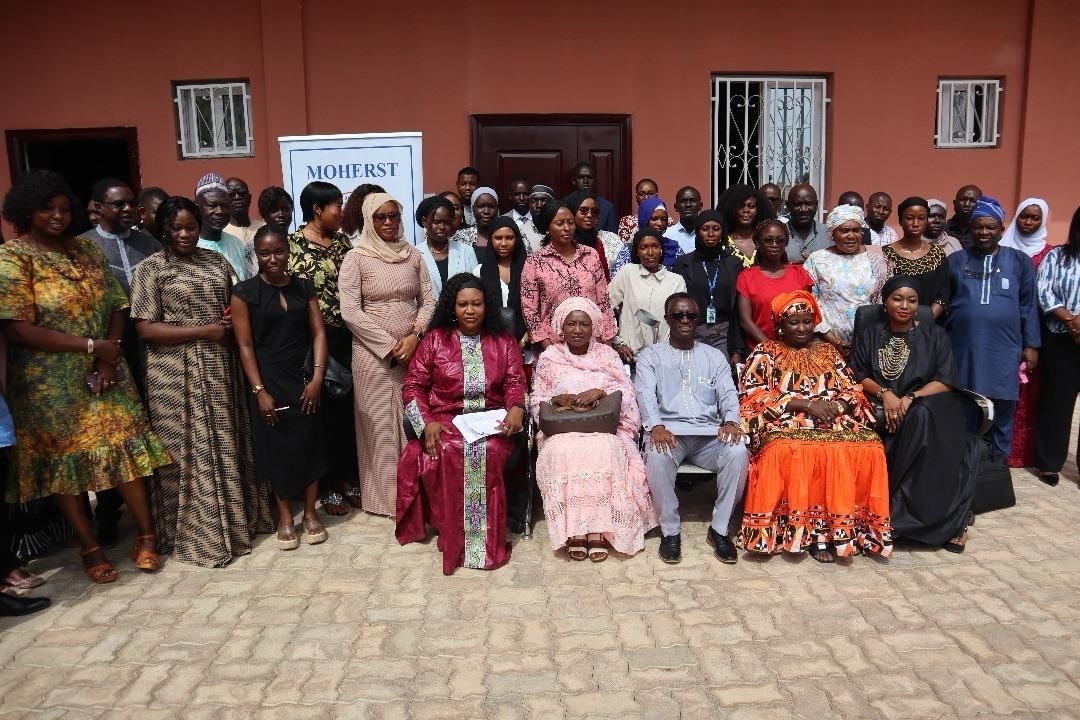
The Honourable Minister of Higher Education, Research, Science and Technology (MoHERST), Professor Pierre Gomez, on Wednesday June 25, 2025, presided over the successful validation of the National Gender Inclusion Policy for the Tertiary and Higher Education Sector.
The validation programme was held at the new location of the Ministry of Higher Education, Research, Science and Technology in Kanifing, opposite Gambia Teachers’ Union Cooperative Credit Union (GTUCCU).
This successful validation of the National Gender Inclusion Policy for the Tertiary and Higher Education Sector was done in collaboration with the Commonwealth of Learning (Col).
The validation brought together stakeholders from relevant institutions, including government, civil society organisations, development partners, individuals, and non governmental organisations, to review and provide feedback on the draft Gender Inclusion Policy, which is developed to address gender inclusion issues in the tertiary and higher education sector.
Speaking at the opening ceremony, the Honourable Minister of Higher Education, Research, Science and Technology , Professor Pierre Gomez, stated that the Gender Inclusion Policy for Tertiary and Higher Education, is not just a policy document, but a beacon of hope.
He noted that the policy document will serve as a tool in the fight against systemic discrimination, barriers, and marginalisation of females, persons with disabilities, and underrepresented groups in the tertiary and higher education sector.
Minister Gomez further explained that the policy document is an instrument that has the potential to increase the enrolment, retention, and promotion of females in leadership and decision-making.
He continued that in Africa, women constitute 51% of the continent’s population, and that in The Gambia, the female population is above 51%, noting that these are significant figures which should be a concern for governments and policy makers.
The Minister highlighted the underrepresented of females in STEM fields, academia, and in decision making due to sociocultural biases and inadequate support structures.
“With the advent of this new policy, the tertiary and higher education sector can now boast of institutions and the workforce, that are gender sensitive and ready to champion equitable societal transformation, through higher learning opportunities for both genders,” he stated.
In his concluding note, Minister Gomez emphasised that the Gender Inclusion Policy policy, signals a collective response to social justice and a thrive towards educating and empowering the female females.
The Permanent Secretary of the Ministry of Higher Education, Research, Science and Technology, Ambassador Jainaba Jagne, described education as one of the most powerful tools for attaining transformative development and empowerment, thus adding that it can only truly empower when it is equittable, inclusive, free from discrimination.
She added that women and girls, and persons with disabilities cannot be left out of development agendas due to their gender or their disability.
PS Ambassador Jagne advanced that the Gender Inclusion Policy will set to promote gender equity, inclusion, and equality in tertiary and higher education to achieve economic growth and sustainable development.
She highlighted the ten policy provisions in the Gender Inclusion Policy, including provisions on access to tertiary and higher education learning environments, gender mainstreaming in administration, leadership, governance, and management and gender equity and inclusion.
The Consultant for the development of the policy, Dr. Aminata Sillah, presented a comprehensive overview of the Gender and Inclusion Policy (2025–2029). She explained that the policy is designed as a strategic framework to close gender gaps, promote disability inclusion, and build safer, more equitable learning environments across both public and private tertiary institutions
Dr. Sillah highlighted that the University of The Gambia records 46% female enrolment, whilst the University of Applied Science, Engineering and Technology (UCET) registers only 20.2%, a gap the policy aims to address by promoting female participation in STEM and TVET.
Citing recent national and international education data, Dr. Sillah emphasised the imminent need for reform. She noted that The Gambia ranked 117th out of 147 countries on educational attainment in the Global Gender Gap Index in 2024. She further stated that the findings of the stakeholder consultations report, revealed serious gender challenges including weak institutional accountability; poor documentation of gender representation; inadequate safe learning environments; and limited accessibility for persons with disabilities. “The policy is not just about increasing enrollments in relevant fields, but also about retention, equity, and empowerment,” she affirmed.
The event was moderated by the Ministry’s Gender Focal Person, Kumba Jammeh, who thanked the stakeholders for honouring the Ministry’s call and for participating in such a significant event. She highlighted that the Gender policy aims to address existing gender gaps in the tertiary and higher education institutions, and ensuring that both the male and female genders, including persons with disability, have equal access to educational opportunities.

